Innovation 16 June 2025
From Ranked to Recommended: What CPG Brands Must Do to Stay Competitive in the Age of AI
From Search Engines to AI Agents: A New Shopping Paradigm
Sevendots, Dubai
5 minute read
For decades, online product discovery has been dominated by search engines—Google, in particular. Shoppers type in keywords like “best shampoo for dry hair” and are met with pages of SEO-optimized links, sponsored ads, and content designed to manipulate algorithms more than inform consumers.
This model, while powerful for advertisers, is flawed for users. It’s noisy, biased, and ultimately driven by commercial incentives.
We are now standing at the edge of a profound shift—from search to advice, from pages of links to single-point decisions, and from SEO strategies to AI optimization. AI agents—intelligent systems that act on a user’s behalf to filter, recommend, and even transact—are replacing search as the interface of discovery [1].
While ChatGPT is a conversational AI agent, it’s just the beginning. Apple, Amazon, Google, Meta, and independent startups are also investing heavily in agentic technology [2] that will soon be embedded in phones, apps, shopping sites, and smart homes.
From search engines to AI agents: The evolution of online shopping
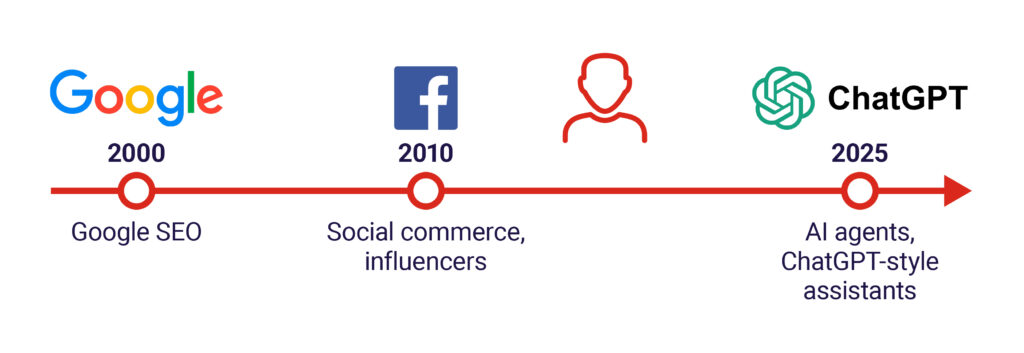
AI agents vs traditional search: Trust is the new currency
AI agents offer a fundamentally different model from traditional search. Rather than pointing users to pages based on backlinks and ad spend, they can converse, contextualize, and recommend based on:
- Verified reviews and real sentiment
- User-specific data and preferences
- Broader knowledge bases and third-party comparisons
This feels more trusted and efficient to consumers. Instead of being overwhelmed by links, users get a single, contextual suggestion: “This is the moisturizer that matches your skin type, budget, and ethical values.”
But this also disrupts the business model of the web. Google’s dominance comes from advertising. ChatGPT and other conversational AI agents – until now – have leaned toward objectivity. That’s beginning to change.
OpenAI recently announced potentially integrating advertising into ChatGPT [3]. This introduces new complexities: Will AI agents remain unbiased guides, or become smarter ad platforms? Will recommendations be earned or bought?
Search engine vs AI agent: How recommendations are made
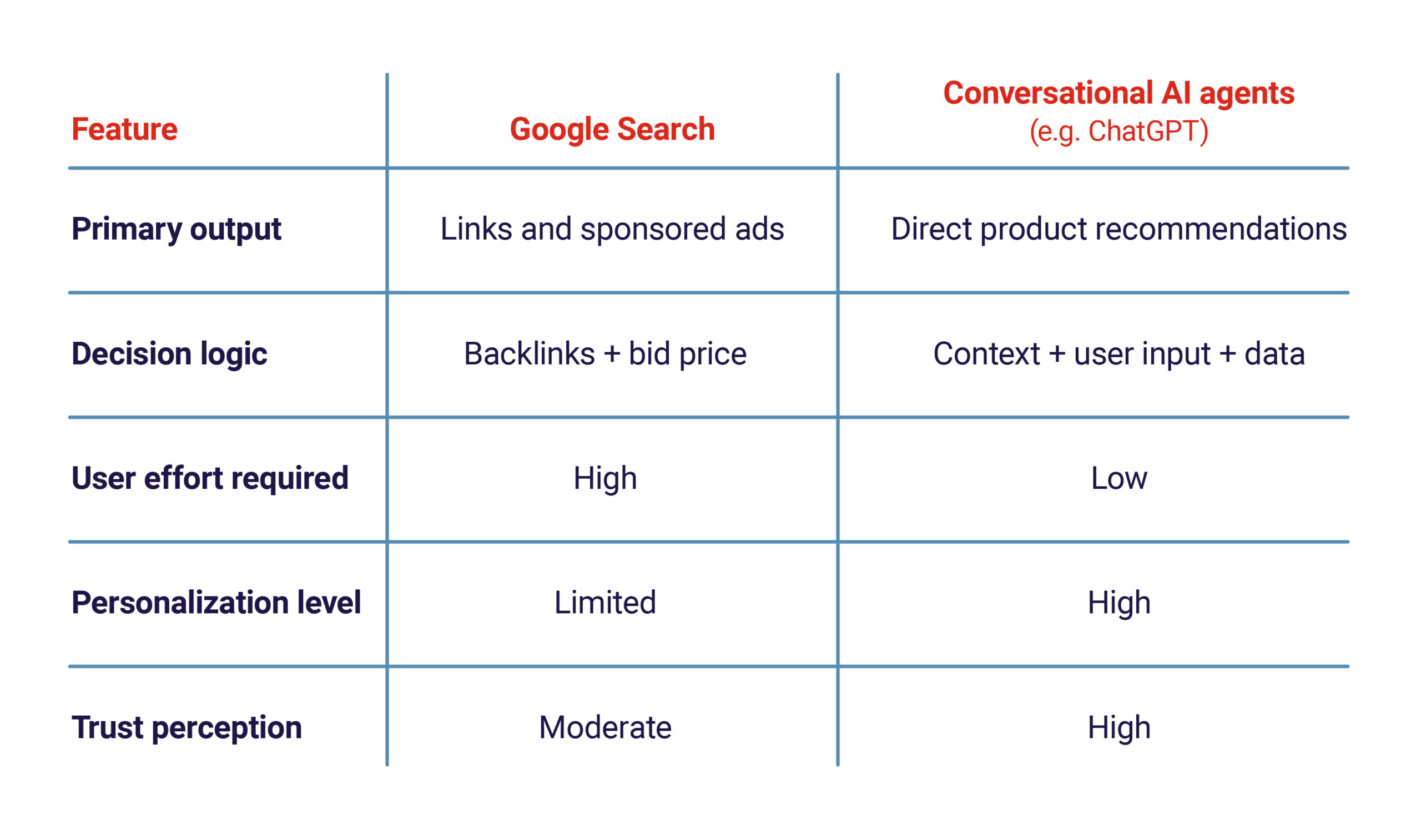
CPG strategy: From search optimization to agent readiness
This shift poses a strategic inflection point for CPG companies. Instead of fighting for visibility through SEO and ad spend, brands now need to earn a spot in AI-driven recommendations.
Here’s how:
1. Optimize for AI agents, not just search
Traditional SEO will remain – but it won’t be the priority. Brands must invest in structured, trustworthy product data that AI systems can parse. That means:
- Clear product descriptions and attributes
- Transparent ingredient disclosures
- Verified reviews and ratings
- Sustainability and ethical certifications
A great example of this is Oatly, standing out with transparent product-level sustainability disclosures and public product Q&A sections that mirror Q&A ChatGPT conversations that consumers may have. Moreover, their fact-based educational content makes it easy for AI agents to parse and explain their products accurately [4].
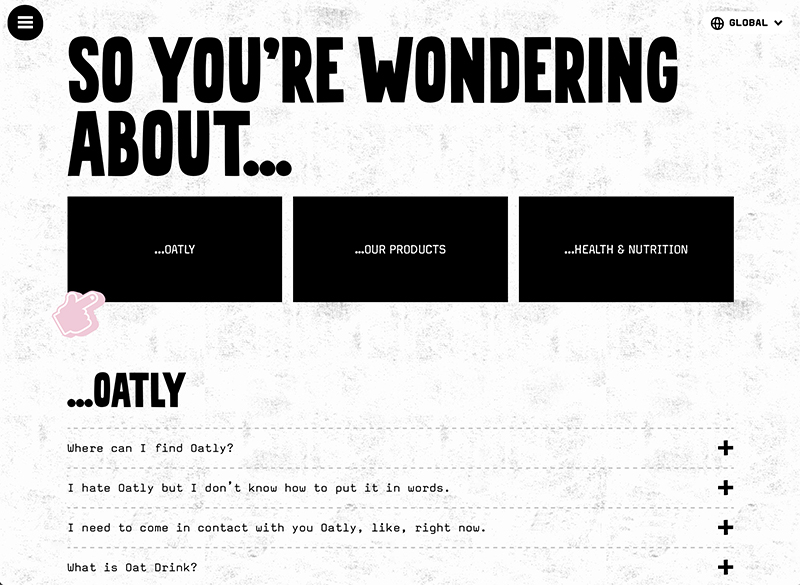
Remember, AI agents scan diverse sources – not just your site. Make your product understandable to machines and credible to consumers.
2. Create a conversational brand presence
Conversational AI agents like ChatGPT draw on broad knowledge bases – including Wikipedia, Reddit, forums, third-party reviews, and published content. Brands should:
- Publish educational, evergreen content (e.g. skincare routines, ingredient benefits).
- Ensure their brand is referenced in credible, structured sources.
- Partner with platforms and data aggregators used to train AI agents.
Glossier is a brand that excels at building a conversational brand presence. Its strong presence on platforms like Reddit and beauty forums – where real customers share authentic experiences – makes it more “discoverable” through conversational AI [5].

If you’re not part of the training data, you’re invisible.
3. Prepare for paid placement – but ethically
If AI platforms include ads (as ChatGPT may begin to), CPGs must rethink how they engage:
- Create native-style, value-adding ads that blend seamlessly into recommendation flows.
- Be transparent, as consumers will reject “stealth” ads.
- Work with platforms to define ethical ad guidelines.
Sephora’s AI-driven product recommendation tools already include a blend of editorial and sponsored content, providing a good model for how native paid placements can work in AI environments.
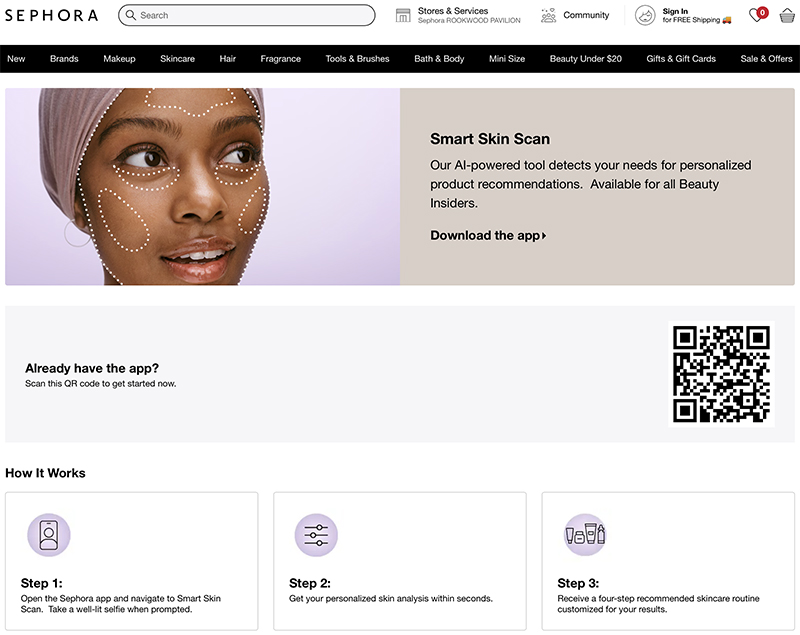
Paid placement won’t go away – but the rules of trust are different in a conversation than in a banner.
4. Build direct-to-consumer capabilities
AI agents may bypass traditional marketplaces. If a user says “send me the best protein bar,” and an agent can complete the transaction – it matters who fulfils the order.
CPG companies should:
- Invest in frictionless DTC infrastructure
- Build loyalty and reordering experiences
- Ensure integration with agent-enabled commerce APIs
This creates brand independence and better access to consumer data.
For example, Nike’s proprietary apps, exclusive drops, and fulfilment logistics enable owning the customer journey end-to-end, making it ideal for AI-driven commerce integration.
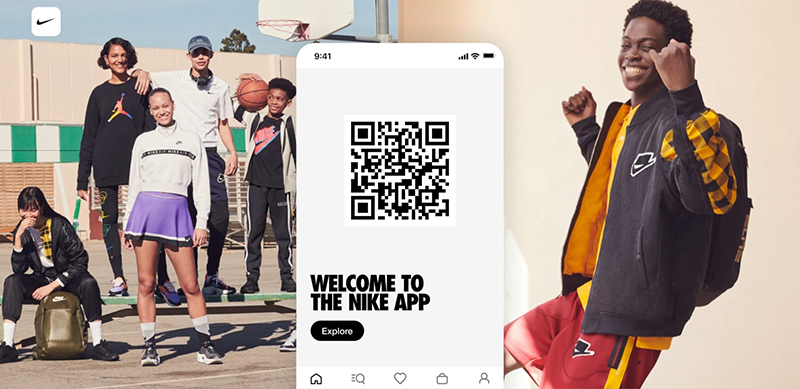
5. Experiment with proprietary agents
Forward-thinking brands shouldn’t wait to be discovered by others’ agents – they should build their own. Examples:
- A personal care brand with a skincare routine coach
- A food company offering meal planning and nutrition advice
- A beverage brand launching a hydration tracker and reminder bot
L’Oréal’s acquisition of Modiface enabled them to develop AI-powered beauty advisors [6] – early prototypes of what branded agents will look like. These proprietary agents deepen brand equity, collect zero-party data, and create defensible channels.
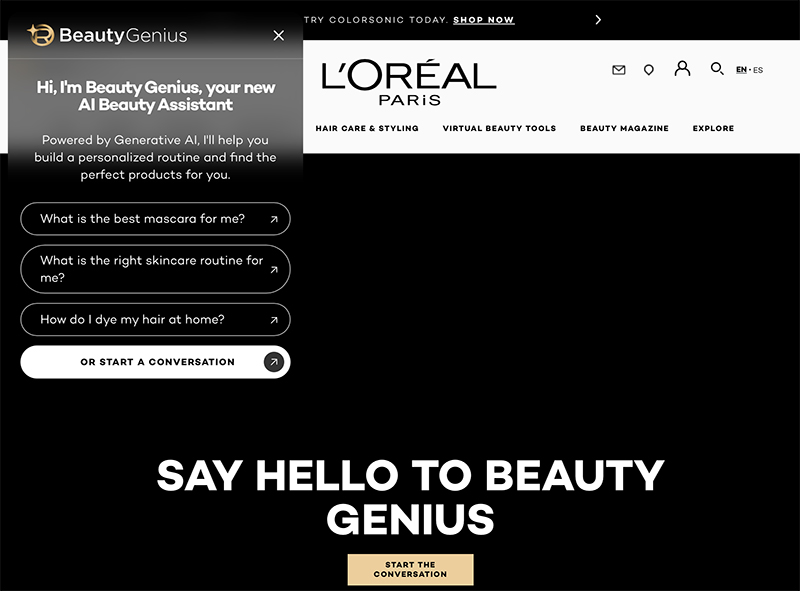
5 strategies for CPG brands to win in an AI agent world
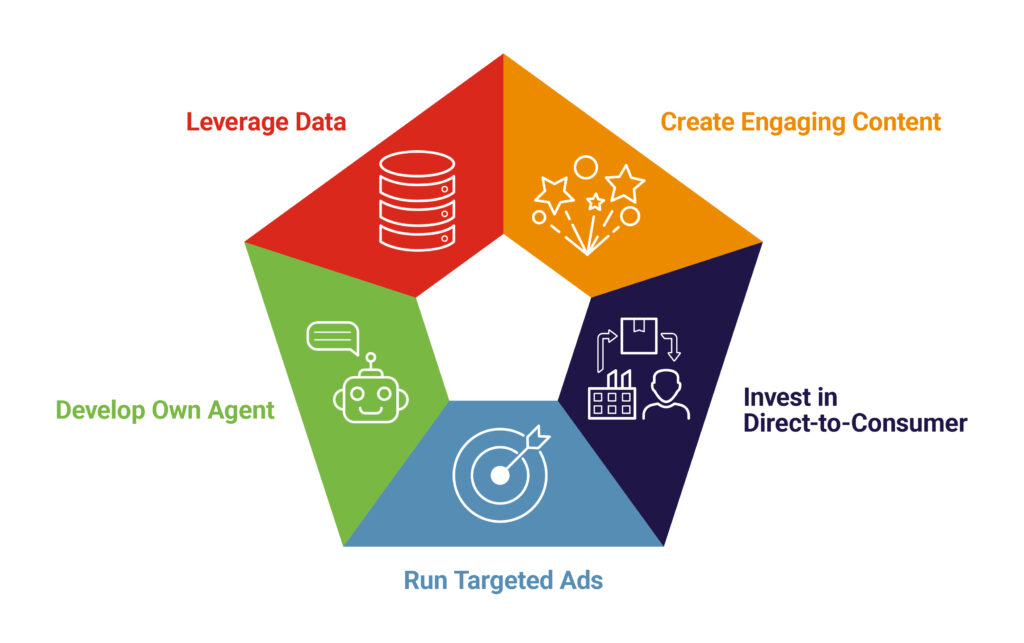
Final thoughts: From visibility to veracity
In the age of AI agents, brand discovery will no longer be about who shouts the loudest – but who offers the most trustworthy, relevant, and personalized answer.
CPG brands that adapt now – by making their data agent-friendly, their presence conversational, and their strategies forward-thinking – will win consumer trust in a world where AI is the first point of contact. The age of SEO isn’t over, but it’s no longer enough. The new race is to be recommended, not just ranked.
Contact Sevendots today to discover more about how to leverage AI in CPG.
